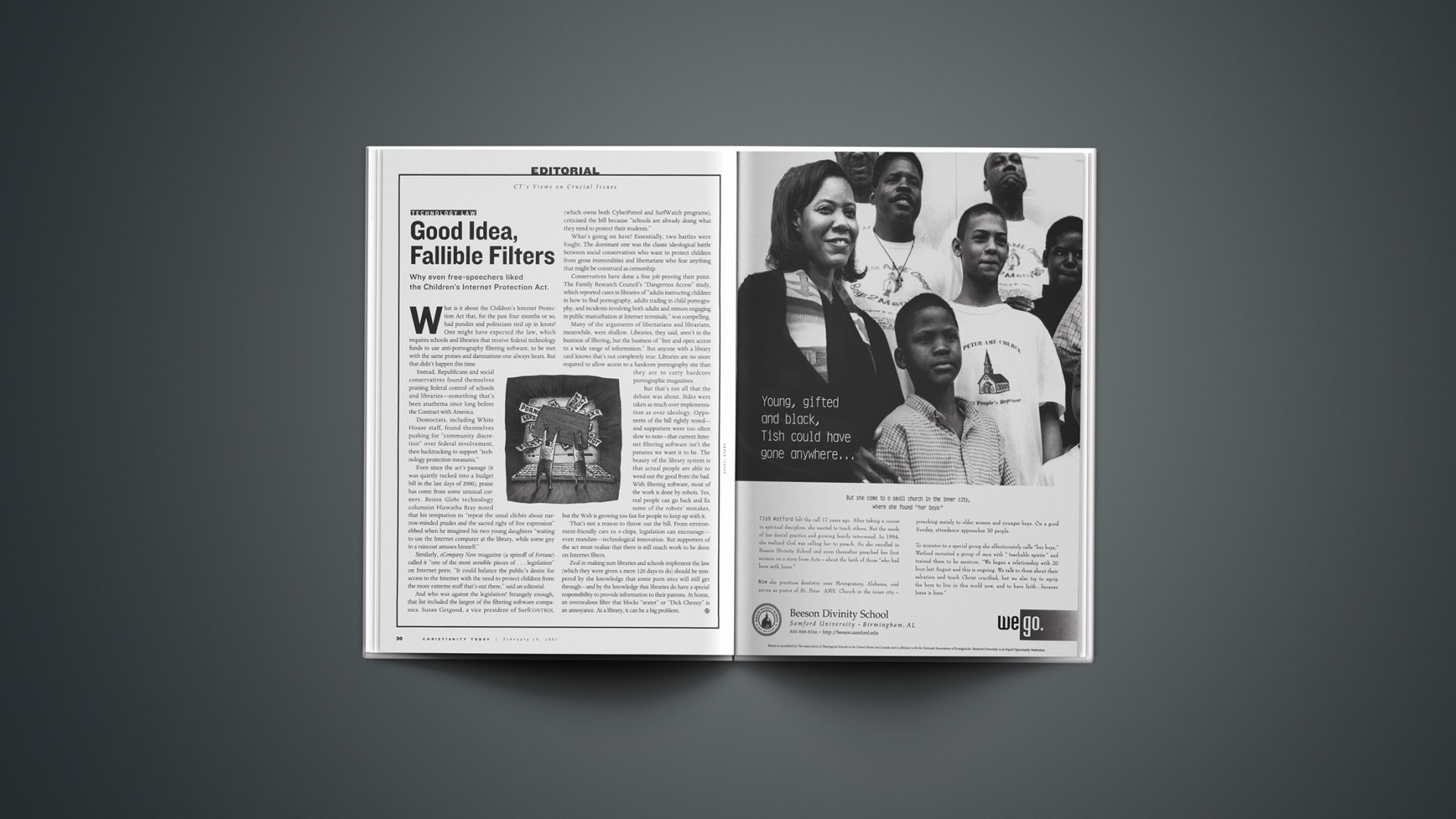Instead, Republicans and social conservatives found themselves praising federal control of schools and libraries—something that’s been anathema since long before the Contract with America.
Democrats, including White House staff, found themselves pushing for “community discretion” over federal involvement, then backtracking to support “technology protection measures.”
Even since the act’s passage (it was quietly tucked into a budget bill in the last days of 2000), praise has come from some unusual corners. Boston Globe technology columnist Hiawatha Bray noted that his temptation to “repeat the usual clichÉs about narrow-minded prudes and the sacred right of free expression” ebbed when he imagined his two young daughters “waiting to use the Internet computer at the library, while some guy in a raincoat amuses himself.”
Similarly, eCompany Now magazine (a spinoff of Fortune) called it “one of the most sensible pieces of … legislation” on Internet porn. “It could balance the public’s desire for access to the Internet with the need to protect children from the more extreme stuff that’s out there,” said an editorial.
And who was against the legislation? Strangely enough, that list included the largest of the filtering software companies. Susan Getgood, a vice president of Surfcontrol (which owns both CyberPatrol and SurfWatch programs), criticized the bill because “schools are already doing what they need to protect their students.”
What’s going on here? Essentially, two battles were fought. The dominant one was the classic ideological battle between social conservatives who want to protect children from gross immoralities and libertarians who fear anything that might be construed as censorship.
Conservatives have done a fine job proving their point. The Family Research Council’s “Dangerous Access” study, which reported cases in libraries of “adults instructing children in how to find pornography, adults trading in child pornography, and incidents involving both adults and minors engaging in public masturbation at Internet terminals,” was compelling.
Many of the arguments of libertarians and librarians, meanwhile, were shallow. Libraries, they said, aren’t in the business of filtering, but the business of “free and open access to a wide range of information.” But anyone with a library card knows that’s not completely true. Libraries are no more required to allow access to a hardcore pornography site than they are to carry hardcore pornographic magazines.
But that’s not all that the debate was about. Sides were taken as much over implementation as over ideology. Opponents of the bill rightly noted—and supporters were too often slow to note—that current Internet filtering software isn’t the panacea we want it to be. The beauty of the library system is that actual people are able to weed out the good from the bad. With filtering software, most of the work is done by robots. Yes, real people can go back and fix some of the robots’ mistakes, but the Web is growing too fast for people to keep up with it.
That’s not a reason to throw out the bill. From environment-friendly cars to v-chips, legislation can encourage—even mandate—technological innovation. But supporters of the act must realize that there is still much work to be done on Internet filters.
Zeal in making sure libraries and schools implement the law (which they were given a mere 120 days to do) should be tempered by the knowledge that some porn sites will still get through—and by the knowledge that libraries do have a special responsibility to provide information to their patrons. At home, an overzealous filter that blocks “sextet” or “Dick Cheney” is an annoyance. At a library, it can be a big problem.
Copyright © 2001 Christianity Today. Click for reprint information.
Related Elsewhere
The Children’s Internet Protection Act (of 2000) should not be confused with the Children’s Online Protection Act (of 1998), which required the distributors of objectionable material to restrict minors’ access to such material over the Web.Hiawatha Bray’s Boston Globe column has been reprinted at SurfControl’s Web site.
A 1997 study by the Electronic Privacy Information Center (EPIC) found that some Internet filters mistakenly registered 98 percent of the information at sites like the American Red Cross, the United Way and the NAACP as “objectionable.”
Last year a library in Michigan rejected the use of filters for adults, saying filters severely limited the search capabilities of users. Read the Associated Press story here.
Other news articles and opinion pieces on the Children’s Internet Protection Act include:
Child-protection law faces challenge — USA Today (Feb. 15, 2001)
Library association plans suit over filtering — IDG/CNN (Jan. 19, 2001)
Filtering software raises ire — The Seattle Times (Jan. 15, 2001)
Internet blocking for blockheads — Steve Chapman, Chicago Tribune (Jan. 1, 2001)
Congress quietly censors the Web — Editorial, Chicago Tribune (Dec. 23, 2000)
Web filtering law likely to launch court showdown — UPI (Dec. 23, 2000)
Filtering Law Sparks Fight | ACLU Opposes Mandatory Software Filters in Libraries — Associated Press/ABCNews.com (Dec. 20, 2000)
ACLJ Promises Legal Defense for New Federal Law Requiring Public Libraries to Use Porn-Blocking Software — Press Release (Dec. 20, 2000)
Congress passes Net filtering bill — AP/USA Today (Dec. 19, 2000)
The First Amendment Center followed the development of the Children’s Internet Protection Act over the past two years:
Senate to consider another Internet filtering bill (Aug. 18, 1999)
Children’s Internet Protection Act clears Senate Commerce Committee (June 24, 1999)
Senators introduce Children’s Internet Protection Act (Jan. 26, 1999)
Previous Christianity Today stories about filter laws include:
Internet Pornography Use Common in many Libraries, Report Says | Librarian-researcher claims American Library Association thwarted study (March 20, 2000)
Child Online Protection Act Challenged | (Dec. 17, 1998)
Christian Leaders Target Cyberporn | (Jan. 6, 1997)










